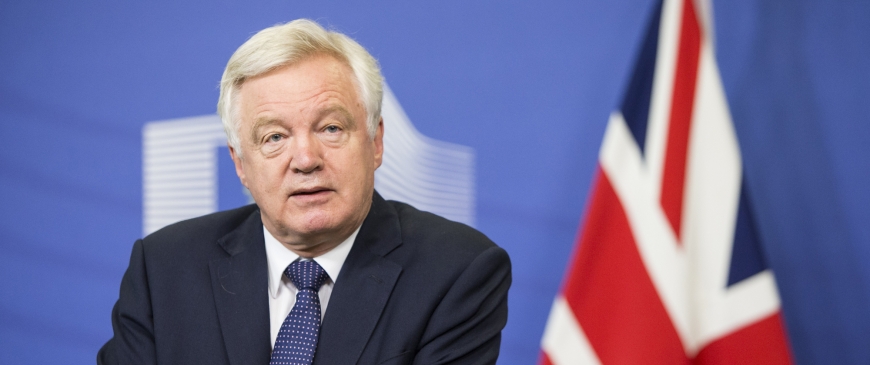
'Putting politics above prosperity' – wait, isn't that what the Brexiteers are doing?
Putting politics above prosperity is never a good idea – that’s what David Davis told an audience of businessmen in Berlin on Thursday in a speech about the continuing negotiations. It’s not clear if he was trying to be funny, but the comment elicited no laughter among those gathered at the Süddeutsche Zeitung’s economic summit. Instead there was genuine befuddlement. Wasn’t that exactly what the UK was doing: putting politics above prosperity? And if, as Davis said, Britain wanted to cooperate as closely as possible with the EU and Germany, a journalist asked, why is it leaving the EU in the first place? The audience applauded that question.
Davis’s speech gave Germans (and other Europeans reading about it later) an insight into the UK government’s thinking on Brexit, but most Germans still have a hard time wrapping their heads around it. His emphasis on common values and friendship are certainly very welcome, as was his unconditional commitment to European security. Germans, too, want deep and comprehensive economic, political and security relationships with their European neighbours, including with Britain.
But that is precisely why Germany has helped build the EU over decades. Co-operation among so many nation states of different sizes, with diverging interests and different economies, can either be shallow and transactional or deep and comprehensive. But for the latter to work, Europe needs common rules, courts and political institutions, like those of the EU. For Germans, the EU is first and foremost a political, rules-based project. Germany’s first priority in the Brexit talks is therefore to protect those very rules and institutions, not to maximise short-term economic gains.
It looks as if Davis’ main aim on Thursday was to win over German businesses so they would lobby Angela Merkel’s government to move the Brexit talks to the next stage – the business of forging a deep and comprehensive trade deal between Britain and the EU. He may be on a hiding to nothing. With supply chains criss-crossing the entire continent, firms in Germany are keen to protect the EU’s single market and its already complicated rule-making process, rather than complicate it further by arranging cherry-picked access for a third country that could set a precedent for others.
Access to the UK market is certainly important for German companies. But they know full well that access to Europe’s markets is even more important for UK businesses. Instead of trying to lobby the government in Berlin, German businesses expect the UK government to come up with a consistent, workable post-Brexit plan. Davis’s speech offered no new detail on this front.
Davis’s pitch to Germany also seems to rest on a flawed assessment – the idea that, ultimately, it is Germany that runs Europe. Berlin is indeed the largest and most powerful capital in Europe. But the EU works for everyone only if it is not dominated by its largest members, especially Germany. During the euro crisis and the refugee crisis, Germany was forced to take a leadership role, and both times it undermined the EU’s popularity elsewhere. Germany will be very reluctant to strong-arm others into compromising with the UK.
Germany also has bigger fish to fry in the EU than Brexit – including the bloc’s relations with Turkey, the refugee crisis, and French President Emmanuel Macron’s EU reform agenda. Eastern Europe is also drifting away, which puts Germany once more in the political spotlight.
While Davis was delivering his speech, a few hundred meters away Merkel and her potential coalition partners were hammering out the outlines of a deal to form a new government. The number of times Brexit was mentioned in the leaked 60-page draft? Zero.
Christian Odendahl is chief economist at the Centre for European Reform.
